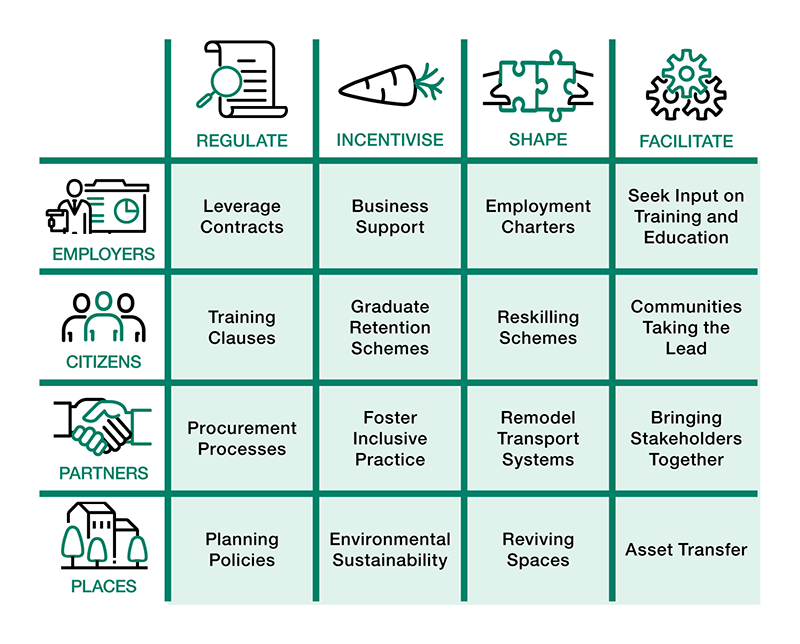It is not surprising that recent years have seen increasing focus on finding fresh approaches to economic policy-making, according to a new report from the New Local Government Network (NLGN).
Launched last week, Cultivating Local Inclusive Growth in Practice states that with median weekly earnings still 2% below 2008 levels, ‘economic growth has manifestly failed to deliver for the vast majority since the Great Recession'.
As a result, ‘inclusive growth' has become something of a buzzword in the local government sector, but with no widely-accepted definition of what exactly the term means, council officers are struggling to implement it in practice, the report has concluded.
What is crucial, according to the report's authors Luca Tiratelli and Charlotte Morgan, is that local government gets moving and overcomes what they call ‘the contested nature of inclusive growth'.
They believe this can be achieved ‘through taking a broad view of the term, seeing it simply as a concern with who benefits from growth, rather than just a concern about its pace'.
This broad view, supplemented with a ‘practice into theory' approach to identifying how to effect change, shows there is ‘much that councils can do, right now, to transform their economies'.
The report has identified four key areas of policy focus that have emerged for inclusive growth as productivity, skills, employment practices and ‘left-behind' places.
The research, which was supported by funding from the Barrow Cadbury Trust, has identified the four general principles that should underpin local inclusive growth strategies as:
- clarity on outcomes
- buy-in from citizens
- local focus
- collaboration and peer learning
The report's methodological approach included a series of three workshops in different parts of the country for people working on inclusive growth in local government, expert interviews with people with an interest in inclusive growth, and a review of inclusive growth strategies published by councils.
The research identified a range of 16 policy levers (see below) that ‘councils can pull to promote local inclusive growth'. The specifics of which policy levers become core or crucial to strategies depends on local contexts – but the framework offers a ‘sense of the breadth of the approach needed'.
The many levers identified for employers, citizens, partners and places include employment charters, graduate retention schemes, fostering inclusive practice, planning policies, remodelling transport systems, procurement processes, and communities taking the lead.
The plethora of practical case studies in the report includes using councils' own spending and their role as an anchor institution as a procurement processes lever. This, it points out, has been a major part of Preston's ‘much-lauded repurposing of the US concept of ‘community wealth building' for the British context'.
The approach is also being explored and/or being implemented in other areas, including Birmingham, Oldham, Islington, Kirklees, Calderdale and Southampton.
One of the practical examples quoted for the ‘remodel transport systems' lever is Bristol, which has identified ‘public transport deficits' as a major challenge to delivering inclusive growth. Its inclusive growth plan recommends the city creates a new transport strategy putting the needs of the poorest at its heart – and this strategy was launched last year.
Alex Gardiner is associate director of consultancy Metro-Dynamics. She told The MJ she welcomed the report as ‘a helpful contribution as inclusive growth is becoming a core priority for lots of councils, which is why we support the development of good practice with practical examples that officers and members can draw from'.
She described the process of developing new models of delivering inclusive growth as ‘difficult, which is why we are working in partnership with Centre for Progressive Policy (CPP), The Joseph Rowntree Foundation (JRF) and the Royal Society for the Encouragement of Arts, Manufacturers and Commerce to develop shared learning about how this can be done'.
But she said it was vital to ‘not forget that this is fundamentally about generating growth that the greatest possible number of people can both contribute to and benefit from.
‘This is the other vital part of inclusive growth – we're not just looking to distribute growth better but rather to expand the numbers of people who are able to contribute to creating that growth.'
Achieving this would require ‘a step change in how decisions are made – and creative, collaborative thinking about how this can happen. And that is a first and foremost an economic issue, not just a public service one'.
Senior policy researcher for the NLGN and joint author of the report Charlotte Morgan told The MJ the juxtaposition of a decade without a recession with the lowest levels of wage growth for British workers for any 10-year period since the Napoleonic Wars ‘paints a stark picture – and shows why so many feel the time has come for us to think differently about what constitutes economic success'.
Local government has a vital role to play, she added – ‘not only in creating wealth in their local areas, but in making sure that this wealth is benefitting everyone.
‘Despite a decade of cuts, our newest research shows that councils are still finding inventive, community-led routes to create fairer economies – often working alongside the community members with the most at stake.'
With the UK about to lose access to EU structural funding next year, her conclusion is that the Government needs to ‘act swiftly to support local, community-led approaches to inclusive growth – so that everyone has opportunities to contribute to and benefit from a growing local economy, no matter where they live or what their circumstances are'.



